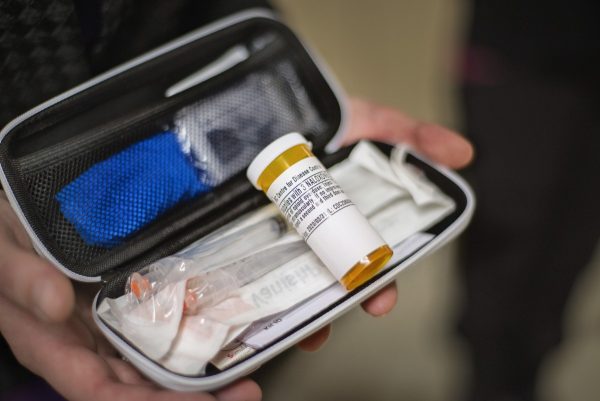In light of the pervasive opioid crisis causing tragic ripple effects across the province, and with the impact deeply felt on campus and within the community, TRU representatives are seeking to provide support, education and preventive measures.
Chelsea Corsi, TRU’s Wellness Centre Coordinator, worked closely with Kirstin McLaughlin, School of Nursing Lecturer, to implement TRU’s Take Home Naloxone program. “This initiative allows us to move beyond substance use education and provide preventative resources,” Chelsea affirmed.
Kirstin offers a wealth of resources and information; she piloted and directed Canada’s first Take Home Naloxone program through the emergency department at Royal Inland Hospital. She has acted as an advisor, facilitator and presenter; she has collaborated on educational guidelines and co-authored the Decision Support Tool—which changed BC’s nurses’ scope of practice to allow for dispensation of naloxone. Above all, she has worked on Vancouver’s Downtown Eastside as a front-line nurse at the supervised injection space InSite and the detox facility OnSite. Her participation was instrumental to the distribution, which coincided with National Addictions Week’s “Addiction Doesn’t Discriminate” education/dialogue sessions.
Naloxone is now available at Counselling, Student Affairs, Disability Services, Early Alert and Cplul’kw’ten. Staff, faculty and the Student Wellness Ambassadors team (SWAT) recently received extensive training. “We want to empower all student development representatives with education and experience in the event concerns around drug use arise,” Chelsea said.
“Supporting the individual at that moment is paramount and can potentially save a life,” Chelsea insisted.
In the event a Naloxone kit is issued, it can be returned to the Wellness Centre so that the kit can be restocked. Kit distribution is accompanied by training and nonjudgmental conversations about harm reduction, which Kirstin referred to as a “pragmatic approach.”
“It’s about meeting people where they are at. Abstinence-based models essentially create serious barriers, which can potentially put individuals at risk,” Kirstin insisted.
As the crisis has risen to a fever pitch, Kirstin said that the harm reduction messages have changed. “It is used to be ‘know your source;’ nowadays it doesn’t mean much, as the supplier doesn’t know either. It’s now more about being prepared and not using alone.”
“We have to be realistic. Substance use happens, and it affects every population. We have to break down the stigmas around that. This is a state of emergency. It is the number one cause of preventable death in the province right now,” Kirstin continued.
“Not only is there a risk of an overdose, but there is also a risk of witnessing an overdose. At this point, that’s all of us,” Kirstin cautioned.
Education and clarification of the inherent dangers of drug use mean also dispelling myths and urban legends. “I have heard anecdotal reports of marijuana being laced with fentanyl; however, to the best of my knowledge, there are no documented cases. Regardless, I would offer that for anyone using substances, a naloxone kit and education about OD prevention, recognition and response is essential,” Kirstin assured.
Chelsea and Kirstin worked alongside Kim Meijerhof, 4th year nursing student, who spent National Addictions Week providing tutorials. She also offered information about the Good Samaritan Act, which “decreases the fear of calling 911.”
Kim remarked, “Sharing information, offering training and hearing personal anecdotes has been very enriching. We all have the potential to save someone’s life.”
Responding to the opioid crisis and fentanyl epidemic in this interactive manner allows for constructive conversation and swift action. Understanding the necessary stages of an overdose helps strip away the layers of helplessness one might feel in the event of crisis. The kit provides a step-by-step approach with the acronym SAVE ME to guide administers through the process. Familiarizing oneself with the information in a controlled environment better prepares the individual to act accordingly in the event of an emergency.
Individuals can complete a naloxone use module online; bring their certificate of completion to distribution site to practice and receive a kit.
Fentanyl is powerful. No one is immune. Make Naloxone part of your first aid kit.
For more information about Naloxone, please connect with the Wellness Centre.

Familiarizing oneself with the information in a controlled environment better prepares the individual to act accordingly in the event of an emergency.

